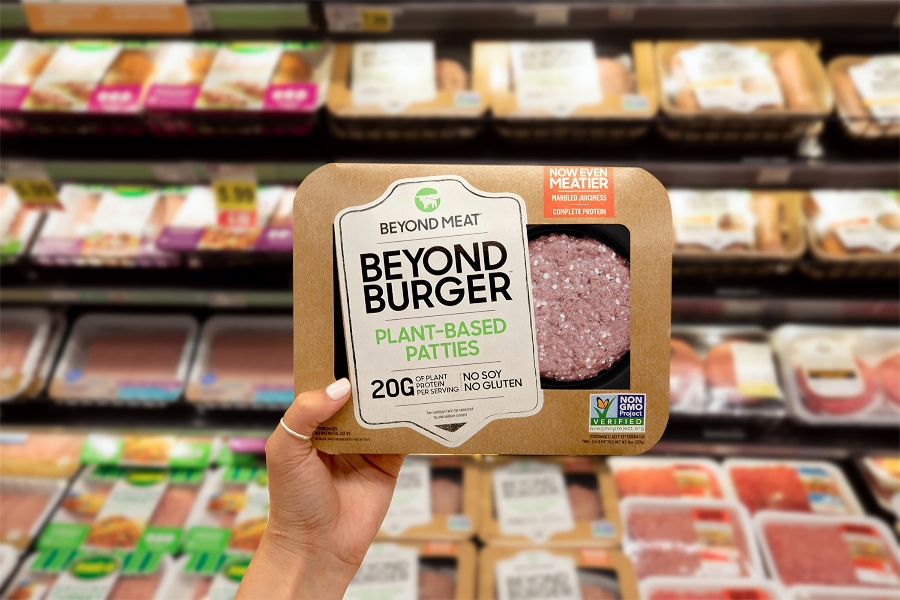Plant-based meat has become a popular talking point around the world, with a growing interest from consumers who want, at least some of the time, to swap out meat for plant-based alternatives. As a result, new plant-based meat suppliers have been popping up and mainstream food businesses and restaurant chains are getting on board. So, what does this mean for your food business?
If you are using meat products in your cooking, whether in prepared meals, your food truck or as a delivery kitchen for takeaways, it’s time to start investigating how and if you could make the switch to plant-based meat.
Below, we look at the various plant-based meats on the market right now, what food brands have started selling it, how customers feel about the products and why you might want to think about making the switch today.
What Is Plant-Based Meat?

Like the vegan burger before it, plant-based meat sounds like an oxymoron. How can it be meat and plant based? Unlike with bean burgers or other ways in which recipes are adapted to swap meat elements for other ingredients, plant-based meat aims to replicate the texture, taste and look of real meat.
Ingredients In Plant-Based Meat
Each maker of plant-based meat has their own combination of ingredients but there are some common ones. They often use soya, beans and/or peas for the protein element. This is combined with yeast to give it a meatiness. They’ll add in their own combination of vegetables and seasoning along with oils. To give the signature ‘bleeding’ of a meat burger, beet juice is added, which also adds natural colouring.
Who Makes Plant-Based Meat?

There are a number of brands that have gained renown for creating plant-based meat, with much of the innovation coming out of the US. However, the UK isn’t being left behind. Let’s take a look at each of these brands – you can find out more about the ingredients they use by checking out their websites:
- Impossible Foods – Impossible consider their meat’s unique factor to be the use of Heme, which is extracted from soybean plant roots and fermented, like beer, with yeast.
- The Meatless Farm – Aiming for complete openness on their ingredients list, they break down the natural source of thickeners and emulsifiers, alongside the plants you’ll be familiar with.
- Beyond Meat – Best known for their ‘bleeding’ burger, beetroot is featured prominently in their ingredients list. Their plant-based meat is also soy free, unlike most others.
- Halo Burger – The UK’s entry, they are starting with burgers, a consumer favourite, and will likely go on to expand. Their Ingredients aren’t listed online (at the time of writing) but are expected to be similar to other plant-based meats.
There are certainly going to be more plant-based meat varieties to come but these are some of the biggest contenders around. While many of these brands have focused on beef alternatives, pork and chicken have been taken on by some brands too.
Which Food Brands Are Selling Food With Plant-Based Meat?
All this innovation from meatless meat manufacturers is meaningless if there isn’t an uptake from restaurants and food brands who can get their products in front of consumers. Yes, a growing number of vegans and flexitarians (the sometimes meat eaters) means there is a demand, but which food brands are making the leap?
Byron
In mid 2019, burger restaurant and takeaway Byron launched two vegan burgers using plant-based meat patties from Beyond Meat. Byron had already been looking to capture the vegan and vegetarian market with falafel and smoked cheese burgers, alongside their beef and chicken ones. Adding the Beyond Burger patties to their menu allowed them to cater to customers with a hankering for meat but who also wanted to make a meat-free choice.
KFC
Starting with trials in the US, KFC began offering the Beyond Meat chicken alternative in the US and quickly had a sellout on their hands. With this success in the bank, a whole store in Rotterdam in the Netherlands will commemorate National Week Without Meat (3rd annual) with a meat-free menu for an entire week in 2020. That means the Beyond Fried Chicken will be the only option for consumers.
Starbucks
Famed for their coffee, Starbucks are going to be offering a vegetarian breakfast sandwich with Beyond Meat. This not-sausage and actual-egg sandwich will be coming out in Canada to begin with, as part of a push towards sustainability for the brand. From the start of March, 1,500 outlets will be selling the breakfast sandwich, with eager eaters around the world hopeful for a global rollout if the trial is a success.
Disney
The biggest of the brands that could get on board, this marks a huge step forward for plant-based meats in the mass market. Disney has partnered with Impossible Foods to bring the Impossible Burger and more meat-free alternatives to Disney’s theme parks, resorts and cruise lines in the US. Bringing plant-based meat to consumers at such a large scale could help increase both interest and enjoyment of the products, and lead to greater demand across the food market.
Benefits & Incentives For Food Brands To Get On Board With Plant-Based Meat

If you are a small or medium food company (that uses meat in your food) then you need strong reasons to start including plant-based meat in some of your offerings or to make the swap completely. Here are three big incentives for your consideration:
- Climate change
- There are more vegans and flexitarians
- Be at the forefront of meat-free foods
1. Climate Change
It can’t be avoided. Many of the calls for the consumption of less meat are due to the impact of large scale farming of animals and the impact it is having on the environment. Cities, countries and regions are being affected by environmental changes and need to make changes to prevent further damage to the world we live in. If you can satisfy your customers with plant-based meat and help combat climate change, that’s a win-win.
2. More Vegans & Flexitarians
Veganism is on the rise, as are flexitarian and vegetarian diets. A lot of this increase is due to climate change, but also animal welfare concerns and a general move away from the diets of the past. With more customers looking for meat-free alternatives in menus, you don’t want to miss out on sales by avoiding providing what consumers want.
You’ll still need to transition some of your customers away from meat, perhaps by offering one of two of your most popular items using a plant-based meat and seeing what the reception is like. You might already have loyal consumers or hopeful customers contacting you about vegan alternatives of your food, which should be a serious incentive to try and make the switch. Do it now and you could be ahead of the curve and it could really benefit your business.
3. Be At The Forefront Of Meat-Free Foods
Innovation is rewarded, especially in a fad-centric market like food. Being at the forefront of the movement towards plant-based meat will put your business on the map for a whole range of consumers who might otherwise not have looked you up. Very few places in the UK offer plant-based meat on their menu and so there is a novelty factor that appeals to many. You can also attract positive news stories and recognition for your brand. Who doesn’t want that?
Time To Sample Some Plant-Based Meat
Food fads change from year to year and many culinary trends suddenly emerge only to then quickly fade away again. But vegan options and meat alternatives don’t seem likely to go anywhere, especially with the growing concern over the environmental impact of meat consumption. You should seriously consider plant-based meats in your menu, perhaps by finding a manufacturer you like and sourcing a sample for yourself to taste the difference.